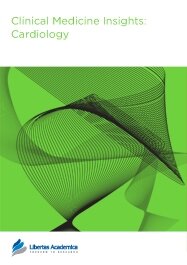

Publication Date: 20 Nov 2012
Type: Original Research
Journal: Clinical Medicine Insights: Cardiology
Citation: Clinical Medicine Insights: Cardiology 2012:6 163-168
doi: 10.4137/CMC.S10141

Background: Endomyocardial fibrosis (EMF) is a restrictive cardiomyopathy, the prevalence of which is declining globally. This study was carried out to determine if there were changing patterns in its local prevalence in South-West Nigeria.
Methods: We reviewed the medical records of all patients admitted to or attending the cardiology clinic or medical outpatient/specialty clinics in the Department of Medicine, Ladoke Akintola University of Technology Teaching Hospital, Osogbo, South-West Nigeria. Medical data for those with EMF from January 2003 to December 2009 were retrieved and analyzed.
Results: Only three cases of EMF were identified from a total of 12,794 medical patients containing a subset of 7956 cardiac patients. The prevalence of EMF was 0.02% and 0.04% for medical and cardiac patients, respectively. All the patients with EMF were in the second or third decades of life, and had right ventricular EMF and atrial fibrillation, but no eosinophilia.
Conclusion: This study shows that the prevalence of EMF has declined in the study area from 10% in the 1960s and 1970s to 0.02% for medical cases and 0.04% for cardiac cases in the first decade of the 21st century. Right ventricular EMF still predominates, but without eosinophilia. Improved health care delivery's positive impact on the control of communicable diseases might be responsible for these observed changes. More work needs to be done both within and outside Nigeria to follow this trend and unravel the mystery surrounding this poorly understood cardiac disease.
PDF (2.02 MB PDF FORMAT)
RIS citation (ENDNOTE, REFERENCE MANAGER, PROCITE, REFWORKS)
BibTex citation (BIBDESK, LATEX)
XML
PMC HTML

I am impressed by the efficiency at each step of submission in the journal. Based on the first-hand experience, I am confident that this journal will have a great future, and the impact factor will rise rapidly.

All authors are surveyed after their articles are published. Authors are asked to rate their experience in a variety of areas, and their responses help us to monitor our performance. Presented here are their responses in some key areas. No 'poor' or 'very poor' responses were received; these are represented in the 'other' category.See Our Results
Copyright © 2013 Libertas Academica Ltd (except open access articles and accompanying metadata and supplementary files.)
Facebook Google+ Twitter
Pinterest Tumblr YouTube